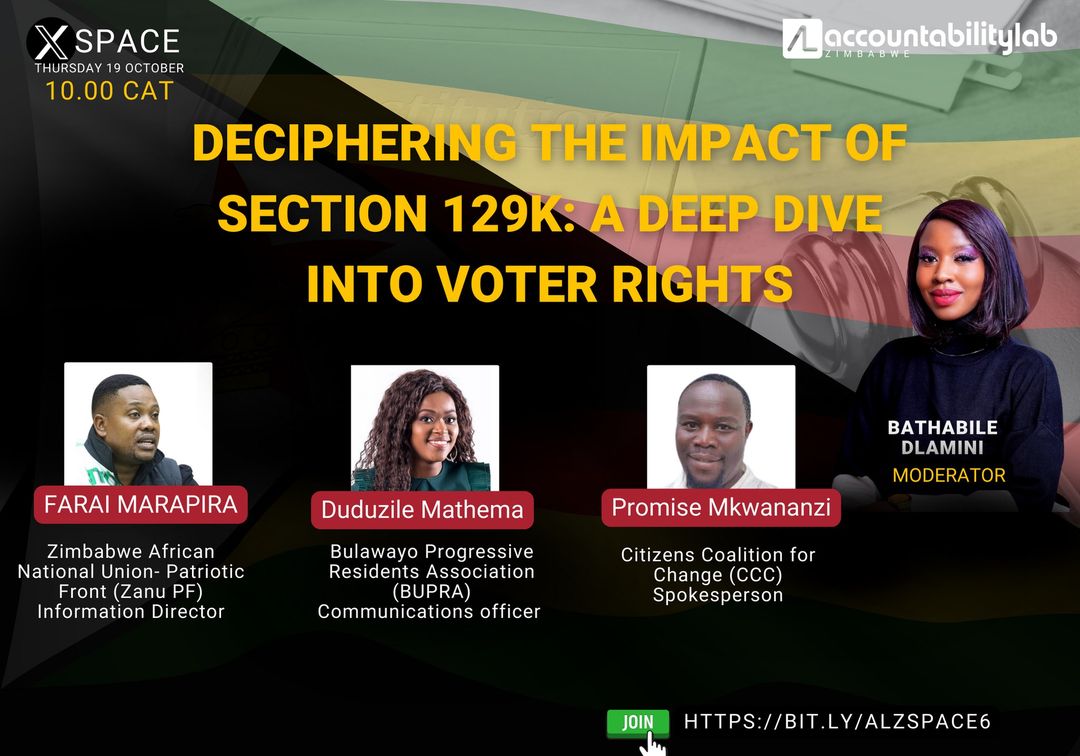NEWS

IN BRIEF
On October 19, 2023, the Accountability Lab X-Spaces organized a […]
SHARE
On October 19, 2023, the Accountability Lab X-Spaces organized a crucial discussion focused on the impact of Section 129 (1) and its implications on voter rights.
The recent recall of elected officials from the Zimbabwe African National Union-Patriotic Front (ZANU-PF) and the Citizens Coalition for Change (CCC) has raised concerns regarding accountability and transparency in the political landscape. The X-Space discussed the constitutionality of recalling elected officials and the potential for citizen inclusion and participation during the recall process.
One of the primary concerns expressed during the discussion was the lack of involvement of citizens in the recall process.
“Residents are still in shock from the recalls that keep happening because, during elections, residents were the most precious cargo in the whole electoral cycle. But now that the elections have come and gone, you’ll notice that residents are being rendered powerless, said Bulawayo Residents Association’s (BPRA) Communication Officer, Duduzile Mathema. She added: “They can’t do anything about the recalls that are currently ongoing because it seems like every day something has to be happening related to recalls.
The parties involved in the recall have failed to consult their constituents or effectively communicate the rationale behind the recalls and their implications on the community.
According to BPRA, the recalls have had a detrimental effect on the development of communities, hindering the representation of affected constituencies in crucial decision-making processes such as parliamentary committees and budget discussions.
Another challenge posed is self-censorship, leading to fear of being recalled, resulting in stifled participation by the remaining MPs and councilors, limiting the diverse range of ideas and perspectives needed for effective governance.
The conversation on citizen inclusion and participation in these recalls has gained momentum in various grassroots WhatsApp groups, especially among residents in Bulawayo.
” This conversation has been ongoing, and it has been triggered further by the letter from the Minister of Local Government and Public Works publishing a list of Bulawayo councilors for recall,” said Executive Director for Community Podium, Nkosikhona Dibiti.
The recent letter from the Minister of Local Government and Public Works, Winstone Chitando, announcing the recall of 12 councilors in Bulawayo has further intensified the discussion. The lack of consideration for the electorate in the decision-making process has left citizens feeling marginalized and without a voice. The absence of citizen involvement raises questions about the value of the electoral process and the significance of voting if elected officials can be removed from office without consulting voters.
The session discussed the interpretation of Section 129 of the Constitution, which provides that the recall process does not require constituents to be included or consulted.
According to Veritas‘ Media Officer (Economic Governance), Paidamoyo Muzulu, this section provides for the circumstances under which the tenure of a member of Parliament comes to an end. Muzulu highlighted that the Constitutional court clarified that a member of Parliament must have been a member of a political party during the election, ceased to belong to that party, and the political party must provide a written notice to the speaker or president of the Senate declaring the cessation of membership. The speaker or president of the Senate is merely facilitative, without any judicial power. Once the speaker is satisfied with the authenticity of the notice, the seat is declared vacant.
The discussion also considered the historical context of section 129 (1) k. Similar provisions were first used in 1989 when ZANU-PF sought to remove Edgar Tekere from Parliament, when he opposed a one-party state. Since then, Muzulu attests, recalls have been employed to settle internal party differences, such as in 2015 when several individuals, including Didymus Mutasa and Temba Mliswa, were recalled by ZANU-PF.
The opposition has also deployed recalls after the 2018 elections when Douglas Mwonzora recalled 22 MPs from the MDC Alliance to resolve internal conflicts, ultimately leading to the formation of the CCC.
However, within the CCC, similar recall letters have been reissued, perpetuating the concern regarding citizen inclusion and participation.
The discussion organized by the Accountability Lab X-Spaces sheds light on the urgent need for citizen inclusion and participation in the recall process. Political parties must consult their constituents and involve them in decision-making, mainly when it involves the removal of elected officials. The lack of citizen involvement erodes public trust in the electoral system and diminishes the value of voting.
It is important for stakeholders, including political parties and civil society organizations, to advocate for greater citizen participation in recalls and other democratic processes. Stakeholders must consult constituents and respect their voices to ensure a more inclusive and accountable political landscape in Zimbabwe.
—
Bathabile Dlamini is the Media and Communications Officer at Accountability Lab Zimbabwe
